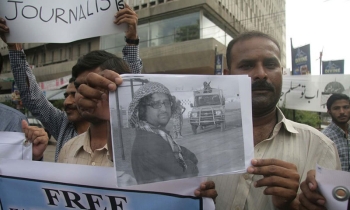Rita was no Katrina, to the relief of an entire nation. But in the aftermath of the first hurricane, which ravaged New Orleans and large parts of the Gulf Coast, broadcast and cable TV took no chances.
From networks calling in their weekday morning-show anchors for weekend Rita duty (ABC's Good Morning America ran five hours Saturday) to wall-to-wall coverage on Fox News, CNN and MSNBC and prime-time specials on ABC and NBC, never has a hurricane-turned-tropical-storm gotten such extensive media attention.
And it all can be laid at Katrina's doorstep: The historic storm may have changed forever the way the media prepare for and cover hurricanes, according to reporters on the scene and executives supervising coverage of Katrina and Rita.
Before Katrina, "the thinking had always been, It's no longer a story once it's no longer a hurricane. Be there when it hits, get out by the time it's downgraded to a tropical storm,' " CNN chief Jon Klein says.
Katrina, he says, taught news outlets that post-hurricane storm surges and flooding, which destroyed levees and much of New Orleans, "are even more dangerous than the initial wind and rain. We know to stick around and wait to see how the story plays out."
The human side of Katrina – tales of agony and misery that thousands of Katrina's victims still endure a month after the storm – also has gripped many reporters, who want to stay on the story indefinitely. "Katrina made a lot of us in the media realize that we can't undersell a hurricane," MSNBC anchor Rita Cosby says from Galveston. "News organizations, the government, everybody now realizes you've got to take Mother Nature seriously."
Cosby has covered about 30 hurricanes, but none came close to "horrific" Katrina. "It changes us not just as journalists but as people," she says. "It has given us more sensitivity."
In one of TV's most emotional moments, Jefferson Parish, La., president Aaron Broussard defended himself on NBC's Meet the Press Sunday against allegations that the charges he made on the program three weeks ago were not true. On the earlier program, Broussard sobbed as he blamed the federal government for essentially murdering the mother of one of his employees; the mother drowned in a nursing home.
Tim Russert said that because a "number of bloggers" have questioned Broussard's account, "MSNBC and other blog organizations" investigated and found that the timing of the death didn't fit Broussard's account, that his employee didn't call day after day as Broussard had said, and that in fact local authorities failed to evacuate her, not the federal government.
Broussard stood by his charges and offered to debate anyone on any of the facts.
Some reporters say they and the nation may be verging on hurricane burnout. After a full month covering Katrina, "there is a sense that everyone is a bit storm-weary, not just people in the media but viewers, too," CBS' Lee Cowan says. "It becomes more difficult to find a different way to tell how big and catastrophic this storm was."
Cowan, who was in Jasper, Texas, Sunday, says that in the short term, at least, many stories will begin, "It was not as bad as Katrina, but "
News executives' ability to balance budgets also is being sorely tested: Not only must they operate in a tight economy, but many must also meet profit goals set by news organizations' corporate owners. And this has been one of the costliest years in terms of coverage: There has been the war in Iraq, the death of one pope and the election of another, the Asian tsunami, the London terrorist attacks and now hurricanes.
"That's why we get prematurely gray and have gastrointestinal problems," says Fox News vice president John Stack. News organizations' contingency budgets are stretched to the limit, he says. "There have been a lot of big, glitzy stories, but if you play the odds, maybe the rest of year is quiet."
Saturday, from the basement of the Hilton Hotel in Lafayette, La., NBC Nightly News anchor Brian Williams said major news organizations would have covered Rita as intensely even without Katrina. After all, he said, by midweek Rita was said to be a Category 5 hurricane. And there was no way that news organizations could predict that two key cities in the path of Rita's eye would dodge the bullet.
Nonetheless, "Katrina sure changed the game," he said. "There is something about watching Americans dying before your eyes for lack of food and water in the United States that has a powerful effect. It has been difficult for journalists to separate themselves."









